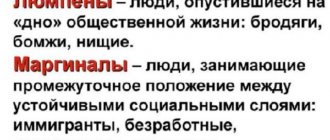Hello dear readers! In the summer, near my house, I found a cute little exotic animal - a turtle. The children were happy with such a find and chased her around the yard and looked after her. And I looked at her and thought that in vain they call turtles slow animals - she moved quite quickly. Perhaps she really wanted to go home? And then another thought came to me: after all, people can also be slow, very slow, but when something happens, or they need to solve something quickly, they “go into fifth gear,” and it turns out that the person is not so “ turtle.” In this article we will talk about the stereotype of “slow” people – phlegmatic people. We will look at who a phlegmatic person is, how he manifests himself and in what he can achieve considerable success.
general characteristics
Hippocrates still lives in his theories. He determined that:
A phlegmatic person is a slow person, since phlegm “flows” in him, which means lymph. For such a person everything is always calm, he is not inclined to take risks, and he rarely has emotional outbursts.
The characteristics of a phlegmatic person differ from melancholic and choleric people in the strength of the nervous system and the processes in it. They are characterized by:
- determination;
- peace and tranquility;
- he is a peacemaker, he will always smooth out conflicts;
- reasonable, tries to analyze the situation;
- speech is smooth, sedate;
- moderate actions and emotions;
- gets along with everyone, but must have personal space;
- Patience is almost the main description of personality.
Demeanor
Perhaps you can immediately spot a phlegmatic person in any crowd. And not because he specifically draws attention to himself. On the contrary, this type behaves calmly and modestly , and dresses as simply and discreetly as possible, but with taste. He doesn't want to be seen at all. This is what makes him stand out from the crowd.
Phlegmatic people can also be recognized by their closed posture : a concentrated gaze at one point, a serious or opposite expression, a relaxed facial expression, fingers often intertwined. It’s like there’s a force field around such a person that silently speaks of personal boundaries: they clearly shouldn’t be violated.
Phlegmatic people accurately grasp the essence of things, approach questions productively and soberly, without unnecessary emotions, having carefully thought through everything and highlighted the main thing.
Representatives of this temperament are considered pleasant people due to their inoffensiveness, calm goodwill and unobtrusiveness.
In general, these are balanced , quiet people.
Psychologist Lydia Neikurs gives an example of a typical phlegmatic person: when everyone around is laughing, he just smiles. And if he reacts more emotionally, then always in moderation.
Character traits
Depending on the educational process in which a phlegmatic person grew up, he will have different character traits. But the main external manifestations of emotional reactions will be similar. So, what are the pros and cons of a person with this type of temperament?
Advantages and disadvantages
Like other types of temperament, phlegmatic cannot be only good or only bad. Therefore, let's look at the positive and negative aspects.
Advantages:
- reaches the goal, sometimes even moves too stubbornly towards it;
- high efficiency, this makes it possible to earn respect in the team;
- peaceful, tries not to conflict;
- resistant to stress - this is highly valued in the team;
- knows how to wait a long time, especially when the reward is great;
- stable nervous system;
- seeks comfort for himself, and, which is very good, for those around him.
The shortcomings of phlegmatic people sometimes irritate even the most frivolous sanguine people. Let's take a quick look at what they are:
- It is very difficult for them to get used to a new environment, rapid changes in conditions are very stressful for them;
- they exhibit apathy, a tendency to loneliness, lethargy, the properties of their nervous system are as follows;
- it is difficult for them to show sociability, since there is almost none;
- they are stingy in showing emotions;
- tend to close themselves off from others about their problems and experiences;
- are inert, this hinders their personal growth.
The good news is that speed can be “increased” if you set a goal. They are purposeful!
Phlegmatic introvert
Phlegmatic people constantly strive for solitude. They are stressed by noise and din; they find it difficult to tolerate parties and noisy companies. Among phlegmatic people, almost all are introverts. And this is understandable. They “feed” on energy from within. To fulfill their need for communication, it is much better for them to talk in private rather than in public.
Such people do not go public, since they are quite satisfied with their quiet, cozy place.
Phlegmatic extrovert
It’s generally a fantasy for phlegmatic people to be extroverts.
Sometimes you can’t pull them out with a stick for a birthday or corporate party. Most often, if you manage to pull them out, they will stand by the window and think about their own things. Rather, among such individuals you will find ambiverts who have an additional type of temperament - sanguine, or close people have brought up sociability and openness in him.
Social media
Phlegmatic people, like others, have accounts on social networks. Despite some closedness, it is still important for them to communicate and stay in touch.
The pages of these types of people are not full of news and excessive information. As a rule, photos or posts periodically appear on them - not often, rather out of necessity.
Since a phlegmatic person is, first of all, a pragmatist, the notes on the wall are often business-like and laconic in nature.
The profile photo does not change often: phlegmatic people tend to be stable rather than fidgety in pursuit of approval.
People of this type value family and closest friends. Their friends are only trusted people.
Separate categories are highlighted (“relatives”, “classmates”, “colleagues”, etc.). They almost never post photos with casual acquaintances.
In personal information about themselves and in contacts, only the most important . Phlegmatic people subscribe more often to scientific and educational groups than to entertainment groups.
Representatives of this temperament from time to time clean their profiles of unnecessary or outdated information, leaving the most relevant information.
They are rarely removed from social networks. You need a good reason for this. A phlegmatic person values stability, so it is difficult for him to break ties, even virtual ones. But it is always registered thoughtfully .
Often such people have few profiles on the Internet, a moderate number of friends and pages to which they subscribe.
The phlegmatic has almost more subscribers than friends. This person does not allow everyone into his life, although he may not limit general access to the page.
As blogger Nasedka , “Loving Phlegmatic is hard, as if you’re pushing a pre-revolutionary wardrobe in front of you alone... But the result is worth it: these are sincere guys.”
And sincerity is a sign of the present .
His page is distinguished by accuracy, some rigor and a minimum of information about himself and others.
Due to this, phlegmatic social networks always look serious and respectable.
Apparently, in moderation and conscious management of the profile .
Features of a phlegmatic man
Men with such a temperament do not have a sweet life in our society. They constantly have to prove their success. In our society there is still a stereotype: “He who stands up gets his slippers.” And many believe that phlegmatic people will not achieve much due to their slowness.
But I will boldly declare that this is a myth. I have a friend with this psychotype who is developing his own business, receives a healthy income, and has a large family with a beautiful wife to boot! Therefore, success is not measured in a slow or fast pace of life, it depends on the development of personality and the desire to develop.
The strengths of phlegmatic men outweigh their weaknesses. They are most often monogamous, taking care of their other halves as best they can. But they are not rich in imagination and words, which greatly upsets their chosen ones.
Also, you will not wait for the initiative to go to the forest or to the sea; such men prefer to tinker with the car or computer. But if they get down to business, they won’t calm down until they complete it 200%.
Phlegmatic man
Definition in psychology
What does the concept of phlegmatic mean, what is its scientific definition, human science will answer this question. A person who is strong in spirit, emotionally balanced, and has stable nervous processes is a phlegmatic person in psychology. The species in question has a rather easy-going character; such a person simply does not show emotional outbursts or a predisposition to rash actions. On the contrary, it is characterized by smoothness, inertia, nervous processes, such as inhibition and excitation, smoothly replace each other.
Note! Phlegmatism is often associated with an introverted communication style, which may be characterized by some inhibition.
At the same time, this individual is credited with perseverance and perseverance in his work activities, which often makes him an indispensable employee. The psychological portrait of a phlegmatic person allows him to be an exemplary family man, a loyal friend, and a worthy leader.
Features of a phlegmatic woman
Such women have a certain coldness and aloofness. They are more self-directed. They are calm and difficult to anger. Therefore, it is comfortable with such women: they will create a “safe haven” at home, create a cozy atmosphere.
But those around her will have to try hard to evoke emotions in her. No matter what they do to her, she will remain outwardly “cold,” although she will internally appreciate the impulses of your soul.
Phlegmatic girl
Rules of coexistence
- Give him privacy. Phlegmatic people are not necessarily recluses, but they need silence and solitude more than others.
- Do not demonstrate your increased emotionality. A phlegmatic person will not appreciate your frantic temperament and eccentric charm. The horror of a phlegmatic person is someone’s outbursts of anger and sudden changes in mood. Therefore, try to remain calm.
- Don’t demand decisive action from him, let him think it over carefully.
- Phlegmatic conservatives avoid changes in life. Moving, renovations, changing wardrobe are shocks for a calm person. If you like to conquer mountains or hang glider, do not try to introduce your phlegmatic person to these extreme activities. Loving you, he may agree to share your intense joy, but this will not be the most pleasant event in his life.
How to raise a phlegmatic child
Such children are the dream of many parents. Where you plant them, that’s where they will stand, and where you put them, that’s where you’ll pick them up. And everything would be fine, but they somehow need to develop: physically, emotionally. Therefore, parents will have to make a lot of effort to raise a Human.
A phlegmatic child can easily drive you into a frenzy when you try to teach or educate him or her about something. If he is stubborn, then only a bolt from the blue can make him change his mind.
Learning lessons with him is torture for a choleric mother. Valerian and other effective sedatives are used. One mother said just that: “For me, it’s better to plow 3 shifts than to learn homework with my son in one evening!” Yes, it’s not sweet for choleric mother in this case either...
But such children are very attached to you in early childhood, since it is difficult for them to adapt to kindergarten, to a new team. These people are often referred to as “not like kindergarteners.” And that's okay. Don’t make children hysterical; if it’s difficult for him around other children, it’s better to teach him communication skills, give him time to adapt, be there.
When phlegmatic people are shy in childhood, their speech is slow, I ask you - do not rush the baby in this case! Build confidence in him, don’t push him, and give him time to comprehend new information.
Often the hobbies of such children are construction toys, mosaics, and puzzles. Contribute to their development. Teenagers tend to rebel, so forceful methods do not work with them.
Childhood
In early preschool age, phlegmatic children are obedient and assiduous. They move little, do not make noise, and rarely cry. Parents have virtually no problems or disagreements when communicating with their baby. You won’t have to remove it from a tree or fence; such children don’t tend to get into trouble. Behavior correction and the educational process take place without emotional breakdowns or explosive passions.
Difficulties appear later, when parents strive to better understand the inner world of the baby. The unsociability of a phlegmatic child is a characteristic that interferes with mutual understanding and identification of the characteristics of his personality. There is a tendency towards laziness and inactivity. He can sit for a long time in a frozen position, placing a piece of paper in front of him, and will begin to draw or write only after an external stimulus - verbal (question) or physical (touch).
The first acquaintance with kindergarten or school is painful. However, having gotten used to the situation and surroundings, phlegmatic children feel comfortable and free. They are slow and calm, which does not prevent them from successfully mastering developmental and educational programs. To avoid excessive passivity, it is better to introduce your child to regular sports or help him find an exciting hobby.
It is important to praise the baby for his efficiency in order to awaken the desire for physical activity. It is better not to leave him alone for a long time, to involve him in outdoor games (catching up, throwing a ball, badminton, table tennis), and to involve him in performing simple household chores. Creative activities (drawing, dramatic performances, sculpting) help to unlock inner potential and find long-term hobbies.
Compatibility with other temperament types
Phlegmatic people prefer not to “combine” with anyone. But if they are already in a situation of short or long communication, let's see what comes out of it.
With a choleric person
Choleric and phlegmatic are a mixture of calm and storm. But, oddly enough, it happens often. This is because opposites attract. In friendship, these are absolutely incompatible people. A choleric person will be irritated by slowness, stubbornness and tranquility. Of course, what sane choleric person would agree to another opinion that differs from his?
A phlegmatic person will be stressed by a constant storm. Still, I want to be friends with a more peaceful person. But there are also long-term friendships when friends are united by many factors.
With a sanguine person
The friendship between a phlegmatic person and a sanguine person is likely to be superficial. This is due to the sanguine person’s frivolity and “thick-skinned” phlegmatic nature. They need to look for common ground of interests, otherwise friendly relations will not last long.
With a melancholic person
Melancholic and phlegmatic: there is no smell of long-term friendship here either. No, well, theoretically it can be, but of all 4 types of people with melancholic, relationships will be the most fragile. A phlegmatic friend will be fed up with eternal “whining,” while a melancholic friend will suffer from misunderstanding and desire for the former’s loneliness.
With a phlegmatic person
It is easier for people of the same temperament to be friends, because they can understand each other. Both phlegmatic people have a great time over a cup of tea, looking at a smartphone, discussing some common topic, again looking at a smartphone. Phlegmatic friends prefer to spend time not at a ski resort, but in a room with a TV, watching some new film.
Such friendship is beneficial for both. Just how long it will last is the question. Without an emotional component, friendships also crack.
To learn how to get along with people, you can undergo special training.
The online intensive “Effective Communication” is suitable for:
- Entrepreneurs, executives, top managers.
- For those who work with clients, middle managers, and freelancers.
- To everyone who is involved in raising children.
- Anyone who wants to improve their communication with others.
The author of the course is Oleg Kalinichev, an expert in nonverbal behavior, emotional intelligence and lie detection. Accredited trainer Paul Ekman International. Managing Director of Paul Ekman International in Russia (PEI Russia).
You will learn:
- Communicate with closed people.
- Coping with daily problems involving other people.
- Influence your environment and much more.
The course lasts 1 month and contains 33 video lectures, 26 exercises, 6 tests + webinars with emotional intelligence experts.
The training consists of 4 blocks:
- Emotions. Basics.
- Emotional stability and emotional flexibility.
- Social efficiency.
- Building harmonious relationships.
How it goes:
- You are watching video lectures.
- Then you complete independent tasks to reinforce the material.
- Participate in webinars and discuss difficult issues.
- Take tests on the material you have studied.
- You complete the intensive course and receive a certificate.
The cost of completing it independently is 1,040 rubles, with a curator – 2,370 rubles.
They will refund your money if you decide within 7 days that the course is not suitable for you.
Phlegmatic and relationships
Marriage and love relationships among phlegmatic people are not emotionally saturated. Often their partners suffer from this and cannot withstand constant external composure.
With a choleric person they can have an excellent marriage. A stormy choleric spouse will calm down next to a peaceful, balanced, phlegmatic spouse. Here compatibility is quite high, provided that each partner tries to maintain the relationship and not get nervous over trifles.
The union with a sanguine person is quite strong, but there is a danger of existing in parallel. The sanguine person will mind his own business, the phlegmatic person will mind his own. It will be difficult for them to communicate emotionally.
With a melancholic person... Good advice: not worth it. It will be torture for both, but if there is great love... Then what could be a hindrance?!
With a phlegmatic person, a marriage union will be very strong, but boring. But a better partner in terms of loyalty and devotion cannot be found regardless of compatibility.
Suitable professions
I repeat, people with a phlegmatic personality type are terrible workaholics. That is why in professional activities these are practices. They do not tend to lead, but they make very responsible administrators who will do more than what they are assigned. They have excellent abilities to perform monotonous activities, so they choose stable professions for themselves.
Phlegmatic people can work:
- dispatchers,
- engineers,
- laboratory assistants,
- system administrators,
- operators,
- veterinarians,
- lyricists,
- proofreaders,
- composers.
But this does not mean that this type of personality cannot communicate at all at work. Such people make excellent doctors and accountants.
They are not recommended to work in places of rapid response, the threat of unforeseen circumstances, in conditions of abrupt switching, changing working conditions. They will not achieve success in journalism as animators or secretaries.
Appearance
People of a given temperament have different body types. But, since this type of nervous system is not involved as intensely as in others, these people are less likely to “eat up” stress. This is probably why phlegmatic people are often slim.
They dress in accordance with their temperament: you will almost never see one of them in a “flashy” outfit, even at a holiday. discreet and neutral colors , and the style of clothing is laconic and classic .
You don’t often see accessories on phlegmatic people. Mostly these are watches or discreet jewelry. Bags are the optimal size, functional, suitable for any outfit.
The hairstyles of people of this type are not shocking: they are often classic haircuts that suit their appearance and lifestyle.
Neatness, neatness and comfort are the main features that a phlegmatic person exhibits, including in appearance.
Famous personalities
Among famous personalities, people of different professions were phlegmatic. Among them there are creative personalities, composers, engineers, writers and even managers. For example, it was news to me that Stalin also had this type of temperament. But, as historians say, despite this psychotype, the leader of the USSR held everyone in an “iron fist.”
Famous phlegmatic people: Galileo Galilei, Steven Seagal, Nicole Kidman, Immanuel Kant, Joseph Stalin, Gennady Zyuganov, Mikhail Kutuzov.











